It’s 50 years since Ballinasloe played host to one of the greatest upsets in GAA history when London’s hurlers proved their worth by stunning Galway to reach an All-Ireland semi-final
By Damian Dolan
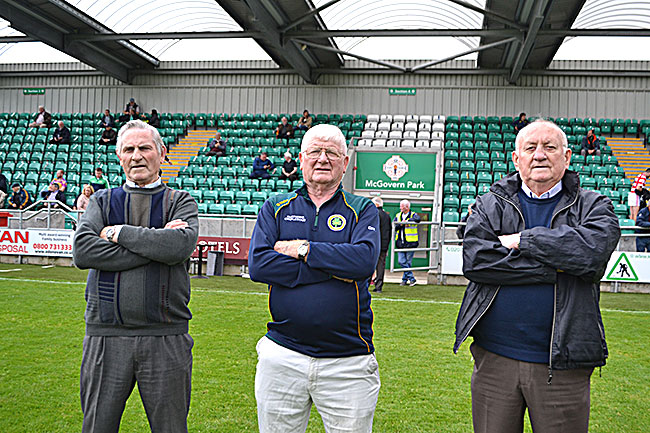
It is perhaps an oddity that a small east Galway town should hold such a significant and special place in London GAA history, but Ballinasloe does just that. The very name, for anyone associated with London hurling especially, is synonymous with one of the county’s greatest triumphs, and will be forever linked.
For it was on 29 July 1973 in the picturesque but inauspicious surroundings of Duggan Park – a ground overlooked by two churches – that the hurlers of Brian Boru, St Gabriel’s, Brothers Pearse, Fr Murphy’s and Naomh Mhuire came together to stun Galway in the All-Ireland SHC quarter-final. It remains one of the GAA’s greatest upsets.
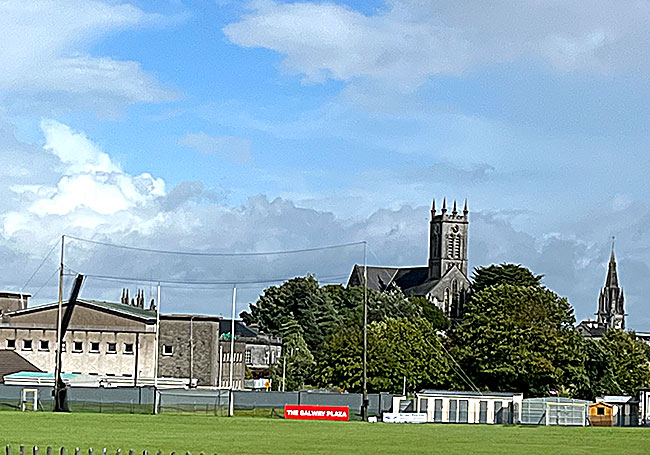
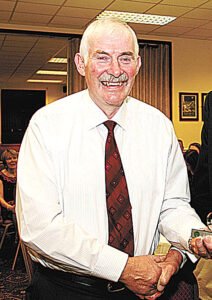
“We were the forgotten boys; London hurling was never spoke about much before that,” says Frank Canning, one of six Galwaymen on the London team that day. 1973 changed all that; people stood up and took notice. It was an unbelievable achievement.”
London midfielder Roger Cashin, from Abbeyside in Waterford, said: “We were massive underdogs; no one gave us a chance. It was unbelievable what happened that day.”
Sentiments echoed by his St Gabriel’s teammate Bill Twomey, who lined up at corner back. Although it’s a long time ago, you never forget it,” he said. “I still remember back to those days; there’s still a few of the lads around – Gerry Rea and Johnny Barrett – and when we meet up, we have a good old chat about it.”
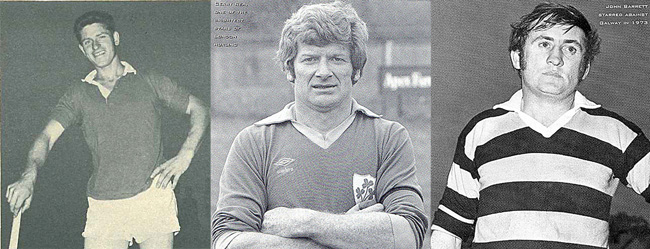
The renowned J.B.D. writing in his column in The Connacht Tribune called it ‘The Day Galway Hurling Died’. He wrote:
After a long illness, borne with great patience by its supporters, Galway hurling passed away quietly at Duggan Park, Ballinasloe, on Sunday afternoon,
It wasn’t perhaps quite as dark a day as that for Galway hurling – the county was already moving in the right direction thanks to a number of emerging young players. The report of its “demise” – like that of Mark Twain, J.B.D. went on to suggest – was “greatly exaggerated”. Indeed. Better times for Galway’s senior team were just over the horizon.
For London hurling, though, it was undeniably one of its greatest days – and vindication for its ascension to the All-Ireland senior championship in 1969.

Ballinasloe had been a triumph years in the making; the culmination of a journey which involved London winning back-to-back All-Ireland intermediate titles in ’67 and ‘68, getting a motion through Congress in ’69 and some heavy defeats in senior at the hands of Kilkenny and Cork (1969-72), before the Exiles finally had their day in the sun (figuratively speaking).
Galway in ’73 was a result which made the hurling world stand up and take notice, and but for some crazy scheduling which demanded they return battered and bruised to Ennis, Co Clare, just seven days later to face Limerick in the semi-final, might even have changed the course of history.
But Ennis is for another day, as it’s to Ballinasloe that our gaze is drawn. Because aside from London’s 1901 All-Ireland SHC win and London’s footballers reaching a Connacht final in 2013, it’s hard to think of a more celebrated moment by a London county team.
Senior aspirations
London’s hurlers collected the last of their five junior All-Ireland titles in 1963. The team was captained by Brian Boru’s Timmy Sheehan (String, Glanworth, Cork) and included Johnny Barrett, and brothers Tom and Martin Connolly. Barrett scored 1-2 in the Exiles’ 4-7 to 3-6 victory over Antrim at Casement Park.
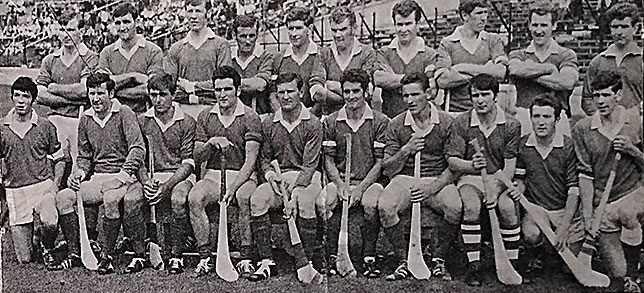
Since 1961, London’s hurlers had also been trying their luck, without success, in the All-Ireland intermediate. They’d lose five finals in a row between 1961-65. That changed in 1967 with an eye-catching victory over Cork in Limerick, which came on the back off a notable semi-final win against Kilkenny at Nowlan Park.
London were eager to make the step back up to senior. None more so than London county board chairman Paddy Ryan.
A Dromaninch, Co Tipperary, and Brian Boru’s man, Ryan was one of the driving forces behind the Exiles’ push for senior status. Story has it, Croke Park told them to go away and win intermediate again. So they did, beating Dublin with ease in the ’68 final at Croke Park.
“Winning those two All-Irelands was great,” says Roger Cashin, who came to London from Waterford in 1965.
The other heroes of ’73 who also played in those two IHC title triumphs were Patsy O’Neill and Abbeyknockmoy brothers Martin and Tom Connolly.
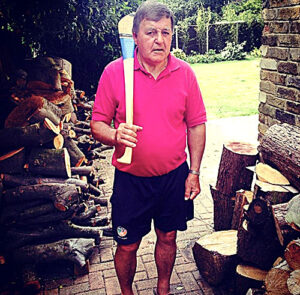
Tom, who’d arrived in London in 1960 when he was just 15, is widely regarded as one of the county’s greatest-ever hurlers. He’d excel against Galway in ‘73, but – at the peak of his powers – his finest hour would come against Limerick in the semi-final in Ennis.
The Irish Independent wrote that “no better tribute could paid to Tom Connolly, leader of the visiting attack, than to say that Limerick experimented with three different men in the pivotal position….” Jim O’Donnell, Sean Foley and Phil Bennis were the men all tasked with trying to stop Connolly.
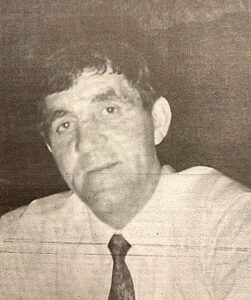
Tom’s older brother, Martin, had made the London number six jersey his own. “Very skilful on the ground and in the air, and a giant of man to play behind, as very few balls came your way when he was in full flight,” is an apt description of Martin Connolly in action.
Tom won 11 London senior championships with Brian Boru between 1962 and 1982, and Martin ten.
London voices could be ignored no longer. A motion was put before Congress in April 1969. It was one of 20 out of 47 motions passed that day, before proceedings closed at 11.30pm. So, with “almost unanimous approval” London were back in the senior hurling championship at the semi-final stage, to meet the Munster and Leinster champions on alternative years. They would make their return on 17 August 1969 at Croke Park against the Leinster champions. It would be the senior All-Ireland’s first semi-final for 11 years.
For the first time since 1910, London’s hurlers were back at the top table. Not everyone was eager to roll out the red carpet, though. Indeed, after London won intermediate for the second time in ’68, John O’Grady penned an article entitled ‘The case against London’.
“They didn’t have much of an argument – they had to give us a chance. We were entitled to a crack at it,” says corner back Bill Twomey, who started all six of London’s senior All-Ireland matches between 1969-74. “It wouldn’t have been fair for London to be playing intermediate for a third year. We’d won it twice.”
Arriving in London in 1961 from Kinsale (Courcey Rovers) in Cork, Twomey played for Cuchulainn’s and St Mel’s of Slough before joining St Gabriel’s in ’63.
Many more welcomed London back with open arms, however. For them the Exiles’ return conjured “nostalgic memories” of halcyon days around the turn of the century”. Foremost of those, of course, being London’s solitary SHC title success in 1901 against Cork.
The team was fully aware of the significance of their return. “We were aware, of course. Paddy Ryan was our main spokesman, and he would be fighting to get us in there,” said Twomey. “Galway had a great footballer called Seán Purcell and he voted against London. That was a big disappointment because he was a Galwayman and most of London were Galway.”
The media feted the Exiles ahead of their semi-final clash with Kilkenny in ‘69, even paying a visit to Wormwood Scrubs to watch the players train under the watchful eye of Timmy Sheehan, who was now the team’s trainer.
Chastening defeats
“Teams used to kill us in the last quarter of an hour.”
But after suffering a chastening 3-22 to 1-10 defeat to the Cats, London’s hurlers were dismissed as not being up to senior level. Of the London team that went on to beat Galway four years later, Tom and Martin Connolly, Brendan Barry, Patsy O’Neill and Bill Twomey all played in that defeat to the Cats in ‘69. It was an observation not without some merit, going purely on results, it must be said.
In 1970, Cork handed the Exiles a 17-point beating at the Gaelic Grounds in Limerick, while in ‘71 Kilkenny had 15 points to spare over them at Croke Park. London and Fr Murphy’s goalkeeper Mick Butler (Rathnure, Wexford) earnt the county’s first All-Star nomination for his performance that day.
Worse was to come in 1972, though, when Cork racked up a score of 7-20 at the Athletic Grounds to send the Exiles packing. London’s place at hurling’s top table was under scrutiny. But to so frivolously dismiss them was to display a lack of understanding of what hurling was like in the city at the time, and the challenges that went with pulling on a London jersey.
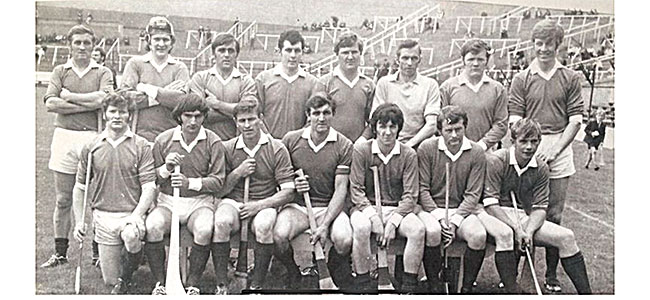
“We had the hurlers, we had the skill, but the fitness let us down,” says Johnny Barrett, who arrived in London in 1961 from Holycross, Tipperary, when he was 17 or 18. “Teams used to kill us in the last quarter of an hour.”
After junior All-Ireland success in ’63 alongside Sheehan and the Connolly brothers, Barrett captained London in their intermediate final defeat to Wexford the following year. He’d hurled senior for Holycross when he was 16, and although he trained with Tipperary minors, he was prevented from playing for them when he was found to be two days over-age. The lack of competitive matches and a lack of training invariably left London’s hurlers undercooked for the “big step up” to senior.
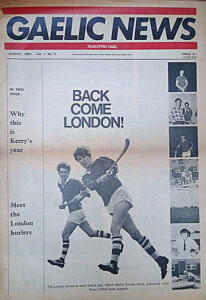
“That was the big downfall of London hurling. You just did a few rounds of Wormwood Scrubs and that was it, and half the guys didn’t turn up,” said Barrett. “We probably never had more than ten training at one at time – some nights you might be lucky if you had eight of your panel of 20-25. “Lads were living very scattered about the city and most went (training) straight from work. “They took their bag on the tube across London, and then you had another hour’s travelling to get home. “It’s very hard to keep a team together in London – it’s not the same as a county in Ireland. It’s a big effort.”
It’s a point echoed by Frank Canning. He said: “It was hard for lads; they were out on the buildings, and they were coming home late and tired. I was up till closing time (working) in a bar.”
What they agree upon is that London weren’t lacking in the skills department – it was their fitness levels that let them down. “We were way below the county teams in Ireland. We were going well up to half-time (against Kilkenny in 1969). We just ran out of steam,” said Barrett. “If we’d trained three nights a week for two or three weeks before them games, we’d have been knocking on the door.
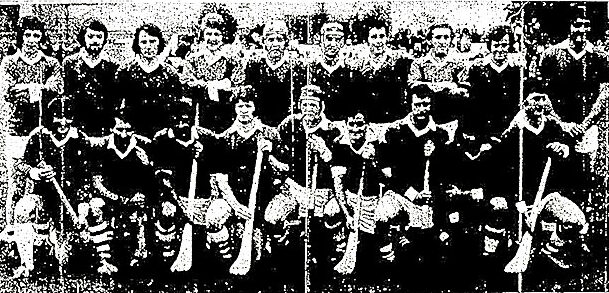
“But we did make a bit of an effort in ’73 because we knew we had a fine team – a really good team.” Frank Canning concurs. He said: “I reckon that (London 73) team would be capable of beating any Irish team if they were training properly.”
Bill Twomey agrees. He added: “Pat Cronin would have got on any team in Ireland at that time, Gerry Rea was a fantastic full back, and the two Connollys – Tom and Martin – would never let you down.”
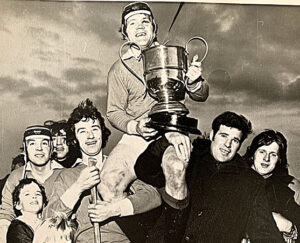
Pat Cronin (Lixnaw, Kerry) had arrived in London in 1965, but it was three years before he played any GAA.
He finally made his championship debut for the Exiles against Kilkenny in the 1971 semi-final.
Cronin went onto win six senior titles with Gabriel’s between 1973 and 1981, as well as being part of the famed Kingdom team which won six senior football championships between 1972 and 1978.
Cronin also won an All-Ireland JFC with London in 1971 when the Exiles beat Dublin in the final at New Eltham.
“Frank Canning went home and played for Galway and Finbarr Gantley won an All-Ireland with Galway. So, these lads were well able to hurl,” continued Twomey.
Nothing spared
The domestic scene in London in the 1960s had been dominated by Brian Boru – more than 20 years after it folded, the club still holds the record for the most senior title wins (28) in the county. The Borus had taken over the mantle from Brothers Pearse, who’d won three-in-a-row between 1957-59. Brian Boru emulated that feat between 1962-64 and 1969-71.
St Gabriel’s first title came in 1965, but after losing four finals in a row between 1969-72, they then harnessed five titles in the space of six years between 1973-78 to become London’s dominant force. It all led to a very healthy rivalry between Brian Boru, St Gabriel’s and Brothers Pearse.
“You’d have some heavy duels,” says Barrett. “They were all good hurlers and you’d shake hands after a match, but there’d be nothing spared in club hurling.” Frank Canning, uncle of Galway great Joe Canning, was part of the Gabriel’s team beaten in three senior county finals at the hands of the Borus. “They reckoned those battles with Brian Boru were better than any hurling in Ireland,” he says.
From the Portumna club, Canning had hurled minor, under 21 and senior for Galway before London invertedly came calling. For the record, his one senior Galway appearance came against Cork in the league in Ballinasloe when he was 17. In 1968, Canning travelled over to London to attend his niece’s Christening in North Finchley. It would be a decade before he went back.
An outbreak of foot and mouth in Ireland initially prevented him from travelling home, where his plan upon his return had been to sit the entrance exam for the Garda. Stuck in London, he got a job in a nearby pub, The Belgrave Tavern, earning £12 a week. He had just turned 18.
“Once I had a job and a few bob, I started to get to know my way around London,” recalls Canning.
St Gabriel’s, a club rich in Galway connections, weren’t long in reaching out to him.
“I was no length living here when they arrived one Saturday night a gang of them. I knew I was going to join the Gabriel’s – they were all from Galway,” said Canning. “When they heard I was gone to England they put a track on me straightaway!” He’d go on to win senior titles with Gabriel’s in 1973, 1974, 1976, 1977 and 1978. Canning’s London debut came in 1971 against Kilkenny. He scored 1-4.
“I remember I was on a man called Pa Dillon – he was a big, rough, tough man. He used to wear these pair of hurling shoes that came up around his ankles. I’m sure he got more belts than he gave!,” says Canning.
The following year, Canning was in the London team which suffered that 7-20 drubbing from Cork. “That was an awful score, but we weren’t training. When a team gets on top of you like that they end up beating you well,” he said. Better times were just around the corner, though.
Fresh opponents
To their relief, no doubt, the 1973 All-Ireland senior hurling championship gave London some rest-bite from Kilkenny and Cork – and instead sent them to Ballinasloe to face Galway in a quarter-final. Galway’s return to the senior stage had come one year later than London’s – and after 12 fruitless years in the Munster championship.
All-Ireland SHC semi-final defeats to Wexford (1970), Tipperary (1971) and Kilkenny in 1972 followed, intermingled with quarter-final victories over Antrim in ’71 and ’72.
Galway’s All-Ireland SHC cupboard may have been bare since 1923, but London were still thought to be nothing more than a warm up for a semi-final clash with Limerick the following weekend.
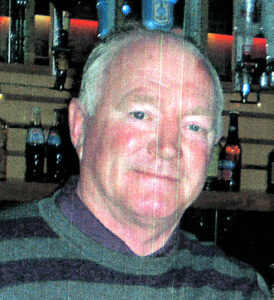
While Galway would be without America-bound Sean Silke, Iggy Clarke and several other members of the county’s All-Ireland under 21 winning team of ’72 had made the step up to the senior team. Some of that under 21 team had been in the Galway minor side which reached an All-Ireland final in 1970. Galway hurling was deemed to be on the up by ’73. “We were massive underdogs. We weren’t intended to win – we were real outsiders,” says Canning. But being one of six Galwaymen on the London team only gave Canning greater “motivation to beat them”.
London’s other Galway-natives were the “well-built” brothers Tom and Martin Connolly, Martin Linnane (Gort), Larry Corless (Kilbeacanty) and Lennie Burke (Portumna).
Canning, Linnane and Burke made it an all-Galway full forward line for the Exiles – and a pretty lethal one at that. Behind them, “a powerhouse manned by three doughty Galwaymen, the brothers Martin and Tom Connolly, centre half back and centre forward, with Larry Corless as the man in the middle,” wrote The Connacht Tribune. Corless was only switched to midfield due to the absence of Fr Murphy’s Sean Kinsella.
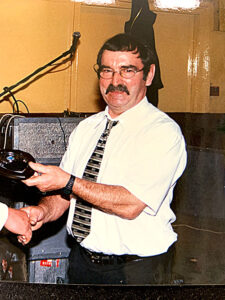
Corless had arrived in London in 1967 and the following year helped Brothers Pearse beat Brian Boru in the county final. The Tribune continued: “….there was more than one old timer in Duggan Park last Sunday wishing that this trio had turned out in the maroon of Galway rather than the emerald green jerseys of London.”
Although not expected to win, London fancied their chances says Roger Cashin. “Sure, we always fancied ourselves. We had some great hurlers – the hurling in London at that time was very strong,” he said. “Most of them would have got on any senior team in Ireland. The likes of the Connollys, Patsy O’Neill, Davey Lalor, Pat Cronin, Larry Corless, Martin Linnane and Frank Canning. They were all fantastic hurlers.
“Francie Condon was a magnificent hurler and Patsy O’Neill was a great character.” Cashin, who was working in Basingstoke at the time said the Exiles put in “a big effort” in preparation for Galway.
Timmy Sheehan was still the team’s trainer, while the manager was Paddy Ryan. The selectors were Eamonn Murray – a London hurling great – and Frank Sheehan. “Everyone pulled their weight; turning up for training was no joke,” he said.
“You could be working 70 or 80 miles outside of London and you’d have to get back for training. It was a very big commitment.”
After being part of London’s back-to-back intermediate teams of ’67 and ’68, Cashin had missed out on London’s senior return against Kilkenny in ’69 having moved back to Waterford. He’d help Abbeyside reach the county final, before returning to London in ’70. “I was a bit choked [to miss the Kilkenny game in ‘69]; I’d loved to have been there, but that’s life,” he says.
Firm favourites
Galway would field a “strong a blend of youth and age” said The Herald in its edition of 28 July, 1973. The Tribesmen, it continued, although “firm favourites” would be “taking nothing for granted” though.
The Galway line up, it noted, included “some surprises”. The omission of Johnny Walsh being one, while Sean Kelly was unavailable due to injury. Returning from injury, though, was corner back Michael McTigue. All-Star John Connolly had been left out “at his own request” The Herald also noted.
John Connolly, in particular, was a “big loss” to the Tribesmen, having been named on the inaugural All-Star team in 1971. “If they’d had him they would have prevailed,” adds Canning, who’d lined out alongside the Castlegar great for Galway minors in 1966.
The Herald went on to strike a precautionary tone when it added that it is “difficult to gauge the strength of the Exiles squad”.
But despite Galway’s poor National League, London weren’t expected to put up more than “token resistance”. Nothing could have been further from the truth. “They took their hurling very serious in Galway, but they didn’t take us that serious,” says Bill Twomey.
“It was just another game to get out of the way – it was a nuisance. They had bigger things in store (Limerick). “But they came a cropper.” Otherwise, the game drew very little in terms of preview coverage. Perhaps because the previous weekend had been hurling county final day in Galway.
The senior decider saw defending champions Castlegar – with John Connolly in their line up – and St Brigid’s Ballinasloe play out a 3-10 to 2-13 draw in front of a 7,000 crowd at Pearse Stadium in Salthill.
As part of a double-header, Meelick-Eyrecourt beat Craughwell in the intermediate final. Castlegar’s Ted Murphy, Gerry Glynn and Michael Connolly, and Craughwell’s Padraic Donoghue, would all feature against the Exiles the following Sunday.
The hurlers of London and Galway, though, would have to vie for spectators with four matches in the second round of the Galway senior football championship. That, and perhaps a disregard for the visitors, would account for the “rather small attendance” at Duggan Park, as noted by Con Kenealy in the Irish Independent. “They obviously thought it was going to be one-sided and a big crowd didn’t turn up,” says Bill Twomey.
While Galway had the benefit of a National League campaign – although they registered just one win against Offaly – this would be London’s first game of the year. Far from ideal preparations and the Exiles were dealt a further blow at the eleventh hour with the loss of corner forward Finbarr Gantley (Beagh, Galway).
“Finbarr arrived into the dressing room on crutches and in plaster of paris. He’d hurt his ankle,” recalls Johnny Barrett. “We didn’t know that he wouldn’t be playing, and Finbarr was a good player.” Indeed, Gantley’s name was listed amongst the London substitutes in the match day programme.
Gantley, who played in goal for Brothers Pearse in the ’68 London county final before going on to win six titles with St Gabriel’s, would later return home to Ireland to play a part in Galway’s victory over Limerick in the 1980 All-Ireland final – the county’s first since 1923. Galway weren’t without their own eleventh hour issues; they’d lose Ballinderreen full back John Fawl – to either flu or a hand injury, depending on your source – half forward Michael Coen (Ballinderreen) and midfielder Sean Murphy (Carnmore). The latter to a family bereavement. All three had been named to start.
Fawl had been nominated for an All-Star in 1971 and his absence, in particular, would be missed at the heart of Galway’s defence. Although he subsequently made an impact off the bench in the full forward line. Galway could still call upon ’71 All-Star nominees Paddy Fahy and Teddy Murphy, but if that was the chink in the Galway armour London needed, the Exiles exploited it ruthlessly in the opening minutes to light up a dull, overcast and wet Ballinasloe day.
Flying start
Flying out of the blocks, London were first to point through their Offaly-native freetaker Brendan Barry. “The ball was thrown in and Brendan Barry stuck it over the bar,” recalled Canning. Canning tested Galway goalkeeper Eamonn Campbell who was equal to the task, but he could do nothing to deny Canning a few moments later. Four minutes gone and the Exiles led 1-1 to no score.
Galway managed a few wides in response, before Patsy O’Neill finished to the net a Barry sideline cut in the tenth minute. “Things started going right for us and we got a couple of goals and all of a sudden we were five or six points up,” adds Canning.
Two minutes later Lennie Burke – a former Galway minor – added goal number three from very near the end line to make it 3-1 to no score. Those present must have wondered what exactly they were watching. This was not in the script – at least not in the one belonging to Galway.
“We started brilliant; Galway didn’t know what was going on. They were so surprised,” remembers Roger Cashin. Barrett simply adds: “We caught them on the hop.” Canning said: “We surprised them; Galway didn’t expect the strength of our team at all.” Canning had “three bites of the cherry” in front of the Galway goal in the 16th minute, and while “many blades of grass must have been removed” he couldn’t make the telling connection to Galway’s relief. Barry knocked over a 21-yard free to keep the scoreboard ticking, though.
Amongst the Galway supporters, a feeling of “mute resignation” spread around Duggan Park. “We dominated every part of the field. Frank Canning, Lennie Burke, Patsy O’Neill, Brendan Barry and Tom Connolly were really on song,” says Roger Cashin. “The Galway supporters probably wished they had a couple of the London lads on their team that day.”
Galway attacks, meanwhile, “broke on the rockline defence in which Gerry Rea (Limerick), David Lawlor (Wexford) and Martin Connolly starred” wrote The Herald, while corner back Johnny Barrett gave an “outstanding” performance.
 Rea, who came to London in 1969, had long established himself as a mainstay of the Exiles’ defence. Gerry Coone finally gave the home supporters “something to cheer about” in the 18th minute when he opened Galway’s account with a free. In an attempt to try and sure up their defence, Galway introduced Craughwell’s Pat Donohue in the 20th minute.
Rea, who came to London in 1969, had long established himself as a mainstay of the Exiles’ defence. Gerry Coone finally gave the home supporters “something to cheer about” in the 18th minute when he opened Galway’s account with a free. In an attempt to try and sure up their defence, Galway introduced Craughwell’s Pat Donohue in the 20th minute.
The Exiles responded with a point from Patsy O’Neill after lovely play by Corless and the two Connolly brothers. With half-time approaching, Coone added a free, but his teammate Paraic Fahy could only find the upright with his placed-ball effort. London survived the ensuing goalmouth scramble which “raised a dust cloud”.
A minute before the break, Barry sent over a free and the Exiles took a 3-4 to 0-2 lead back to their dressing room with them. In the Galway changing room changes aplenty; Gerry Coone moved to left half forward, Andy Fenton to full forward and the introduction of Gerry Holland in place of Michael Connolly.
Those changes and the home side’s greater need saw Galway start the second half with three consecutive wides. They were then given the possibility of a lifeline when London goalkeeper Eamonn Walsh spilt Frank Burke’s shot, and was adjudged to have handled the ball on the ground.
Renewed impetus
Fahy was summoned forward to take it, but while his strike was “low, hard and true” London captain and full back Gerry Rea was equal to it. Tom Connolly helped the ball on its way, and quick as a flash Barry sent it over the bar at the other end.

Straight from Campbell’s puck-out, Canning played in Lennie Burke for London’s fourth goal, and Martin Linnane – making his championship debut for the Exiles – followed that up with a point. We’d played seven and a half minutes of the second half and London’s lead was now an imposing 4-6 to 0-2.
With 15 minutes to go, and heavy thundery rain now falling on Duggan Park, John Fawl replaced Grealish in the Galway forward line. The move immediately reinvigorated the Tribesmen. Gerry Glynn’s high ball into the London square in the 47th minute was lashed to the net by Gerry Holland. It was the home side’s first score from play.
Even more so when Frank Burke droved a close-in free to the net. The rain was now “forgotten”. Under the cosh, London broke out and Canning claimed the visitors’ final point of the game. Five minutes before the end, Corless left the field with his face “streaming blood”, but he’d “done more than enough to merit the generous round of applause that greeted him as he came off the field”, noted The Connacht Tribune. Galway “could never get properly to grips” with Corless, said The Herald.
With Corless gone, Galway had “more room to manoeuvre” in that area of the field, with London’s defence now coming under relentless pressure. “Our tongues were out for the last ten minutes of that game, but we held out to win,” says Johnny Barrett.
Paraic Fahy pulled another point back and with a minute left on the clock a rush of blood from London goalkeeper Eamonn Walsh resulted in a third Galway goal.
Having made a good save, Walsh was working his way through the maroon jerseys as they rushed at him, when he reacted to the challenge of one “over exuberant” Galway player.
Walsh “paused in retaliation” and was duly penalised by referee Mick Spain. Johnny Barrett remembers it as a “big shemozzle”.
“Our goalkeeper caused an awful row; he came out with a ball and cleared it down the field, but on the way back I think he struck my man,” said Barrett. “And then the row started – a free for all. But it was handbags stuff.”
John Fawl despatched the resulting 21-yard free into the net to bring the home side back to within five points (4-7 to 3-5). Recalling the incident, Roger Cashin said: “I went a bit berserk, and I went in and I hit the crossbar with my hurley, trying to get Walsh to shake up his ideas.
“We were well on top, and that goal brought them back into the game.” But that’s how it finished; time wasn’t on Galway’s side and the Exiles saw out the final few minutes without further alarm. London had registered their first win in the All-Ireland SHC since 1901 when they similarly stunned Cork in the final at Jones’ Road – a game, of course, not played until 1903.
Worth proven
After four years of offering little more than a “training spell” for Kilkenny and Cork, London had finally “proved their worth”, wrote Con Kenealy. London, he noted, were “by far the better side” on what he described as a “disastrous day for Galway hurling”. With six Galwegians in the London team, The Connacht Tribune made the observation that “Galway’s best hurlers are no longer in the county”. A fact J.B.D. described as “cold comfort” in his Connacht Tribune column.
 London’s exiled hurlers had a shown “a will and a determination and a dedication to the game far beyond that of the home-based players”, The Tribune added. The gravatas of what they’d just achieved wasn’t lost on London’s players. “The whole of Ireland was shocked – we knew it was big,” said Johnny Barrett. Bill Twomey headed straight to the hospital in Ballinasloe to get “three or four stitches” put in. “We were over the moon – we’d beaten Galway. It was a big thing,” he said. “We went there hoping to put up a good show, but we certainly didn’t expect to win. We probably played above ourselves.”
London’s exiled hurlers had a shown “a will and a determination and a dedication to the game far beyond that of the home-based players”, The Tribune added. The gravatas of what they’d just achieved wasn’t lost on London’s players. “The whole of Ireland was shocked – we knew it was big,” said Johnny Barrett. Bill Twomey headed straight to the hospital in Ballinasloe to get “three or four stitches” put in. “We were over the moon – we’d beaten Galway. It was a big thing,” he said. “We went there hoping to put up a good show, but we certainly didn’t expect to win. We probably played above ourselves.”
Roger Cashin believes that Galway underestimated the Exiles that day. “Definitely; without a doubt. I’d say they thought they’d just turn up and they’d be into the semi-final,” he says. “We were delighted afterwards, and Galway were shocked. They couldn’t believe what happened. It was a great achievement and magnificent to be involved in such an occasion.”
Canning recalls the London players heading to Hayden’s Hotel in Dunlo Street, in Ballinasloe, after the match. “We were ignored really; the Galway County Board didn’t do anything for us. They got an awful shock when they got beaten, they didn’t expect that,” he said. Barrett says it was then back to the team hotel in Athlone for a “big session”.
“We didn’t get back to London until Monday night. A gang of us then went to a pub in Kilburn,” he recalls. London’s reward was a trip to Ennis to face newly crowned Munster champions Limerick – a semi-final that would pit London full back Gerry Rea against his brother Ned.
The Exiles’ hopes of a first All-Ireland SHC final appearance since 1901 would be dashed, though, by a mere seven-day turnaround, a honeymoon and a ten-hour flight delay at Heathrow Airport. But that’s a story for another day.
More than 50 years since Ballinasloe unwittingly became part of London GAA folklore, the passing years have not diminished the achievement of the county’s hurlers that July 1973 day. “Did we know we’d done something special? Of course, we did! And we still do today,” says Bill Twomey.
All-Ireland SHC Quarter-Final
London 4-7 vs 3-5 Galway
Sunday 29 July, 1973, Duggan Park, Ballinasloe
SCORERS:
London: L Burke 2-0, F Canning 1-1, P O’Neill 1-1, B Barry 0-4 (1f), M Linnane 0-1. Galway: F Burke 1-1 (1-0f), G Holland 1-0, J Fawl 1-0f, G Coone 0-2f, P Fahy 0-2.
LONDON:
Eamonn Walsh – Naomh Mhuire (Slieverue, Kilkenny); Bill Twomey – St Gabriel’s (Courcey Rovers, Cork), Gerry Rea – Brothers Pearse (Effin, Limerick), Johnny Barrett – Brian Boru (Holycross, Tipperary); Pat Cronin– St Gabriel’s (Lixnaw, Kerry), Martin Connolly – Brian Boru (Abbeyknockmoy, Galway), Dave Lalor – Fr Murphy’s (Adamstown, Wexford); Larry Corless – Brothers Pearse (Kilbeacanty, Galway), Roger Cashin – Brian Boru (Abbeyside, Waterford); Patsy O’Neill – Brian Boru (Cappawhite, Tipperary), Tom Connolly – Brian Boru (Abbeyknockmoy, Galway), Brendan Barry – St Gabriel’s (Kinnitty, Offaly); Lennie Burke – Brothers Pearse (Portumna, Galway), Frank Canning – St Gabriel’s (Portumna, Galway), Martin Linnane – St Gabriel’s (Gort, Galway).Sub: Donie McCarthy – St Gabriel’s (Carrigtwohill, Cork) for Corless.
GALWAY:
E Campbell (Kiltormer); M McTigue (Ballinderreen), T Cloonan (Pádraig Pearses), T Duffy (Turloughmore); P Niland (Ardrahan), T Murphy (Castlegar), I Clarke (Mullagh); G Glynn (Castlegar), L Glynn (Athenry); M Connolly (Castlegar), A Fenton (Kiltormer), S Grealish (Carnmore); G Coone (Mullagh), F Burke (Turloughmore), P Fahy (Carnmore). Subs: P Donohue (Craughwell), for Duffy, G Holland (Turloughmore) for Connolly, J Fawl (Ballinderreen) for Grealish.
REFEREE: Mick Spain (Offaly)


